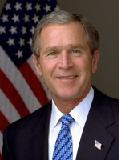Bush in Russia ahead of G8 summit
 US President George W. Bush has arrived in Russia ahead of a G8 summit in St Petersburg at the weekend.
US President George W. Bush has arrived in Russia ahead of a G8 summit in St Petersburg at the weekend.
On his arrival Mr Bush met Russian NGO leaders. Later on Friday he is due to dine with President Vladimir Putin.
On Thursday the US president said he would be "firm" in expressing his concerns over freedoms in Russia.
Despite a thaw in the run-up to the summit, relations between the two nations have been frosty over recent months, our correspondent says.
The US president and his wife Laura arrived in St Petersburg to an understated welcome, the Associated Press news agency reports.
They immediately went to pay their respects at a monument honouring those who defended the city during WWII before meeting human rights, education and environmental activists.
'Colonialist rhetoric'
Before arriving, Mr Bush said he would raise concerns about freedom in Russia during private meetings with Mr Putin - but he added that he would not lecture his Russian counterpart.
"Our job is to continue to remind Russia if she wants to continue to have good relations she needs to share common values," Mr Bush said while in Germany.
"I'll be firm about my belief in certain democratic institutions. I'll be firm in belief about the need for there to be an active civil society [in Russia]."
The two leaders are due to dine at the opulent 18th Century Constantine Palace, which will host the G8 meetings.
Mr Bush's comments came two days after President Putin accused Western critics of Russia's record on democracy of using "colonialist" rhetoric.
In TV interviews to foreign media, Mr Putin said it was unacceptable for the West to use the issue to interfere in Russia's affairs.
'Fundamental ambivalence'
The BBC's Jonathan Marcus in St Petersburg says President Bush arrives in a resurgent Russia, one that describes itself as an energy superpower, eager to play a role on the world stage.
The G8 summit provides just such a platform for Mr Putin, he says.
But he adds that for the Americans there is a fundamental ambivalence in their dealings with Moscow.
Some top US officials, including Vice-President Dick Cheney, have recently accused Mr Putin for backsliding on democracy and using its vast energy resources to blackmail its neighbours.
There are also those in the US Congress who believe that it was a mistake to hold this summit in Russia at all, our correspondent adds.
But he says Mr Bush also needs to keep his relations with Mr Putin on an even level.
Pro-democracy campaigners say dozens of delegates of alternative summits in St Petersburg and Moscow have been detained.
(Published BBC News, July 14, 2006)
_______________